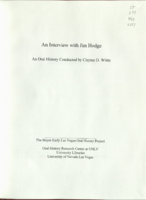Search the Special Collections and Archives Portal
Search Results

Transcript of interview with Ivory Blue II by John Grygo, February 22, 2013
Date
Archival Collection
Description
Ivory H. Blue II was born and raised Las Vegas, specifically in the Westside neighborhood projects during the 1980s and 1990s. He describes his early childhood and what he remembers as a strong sense of community. Though grade school had its challenges, Ivory excelled in sciences and came under the watchful mentoring of Dr. Eugene McGaugh, a professor at UNLV. Ivory graduated with a master’s degree and has a long career already with NV Energy. Theresa Harris, Ivory’s mother, was from Hawthorne, Nevada and his father, Ivory Blue I, was originally from Edwards, Mississippi.
Text

Transcript of interview with Betty Bunch by Joyce Marshall, January 9, 1996, February 7, 1996, & February 13, 2002
Date
Archival Collection
Description
Betty [Rosenthal] Bunch began dancing as a child. By the time she was nine years old she decided she would have a dancing career. At 18 years she began to work in stock theatre productions. Within a short time, she had joined the Moro-Landis dancers. She landed her first job in Las Vegas in 1956 at the Sahara Hotel as part of the opening line for Donald O'Connor. Following the Sahara, she worked as a dancer at the Riveria, and then returned to the Moulin Rouge in Hollywood. In 1961 while vacationing in Las Vegas, she landed a job dancing at the Dunes. She continued to dance, sing and do comedy until after the birth of her second child. At that time, she retired from the Las Vegas showroom, but not from show business. Her involvement in both film and stage has remained rich and varied. This interview focuses on the time Betty spent performing on the Las Vegas strip, including her long involvement with the acclaimed afternoon show Bottoms Up. The interview provides information on workin
Text

Transcript of interview with Edwina E. Danzienger by Leanne Terry, February 26 & 29, 1980
Date
Archival Collection
Description
On February 26 and 29 of 1980, Leanne Terry interviewed Edwina E. Danzinger (born 1925 in Houston, Texas) about her life in Southern Nevada. Danzinger first talks about her family, specifically her siblings, children, and grandchildren. She also talks about church membership, early housing in Nevada, her husband’s work on the Nevada Test Site, and her family’s hunting practices. Danzinger then describes her involvement in Boy Scouts and hiking, her various positions of employment at the University of Nevada, Las Vegas, how the college campus has changed over time, and how the college students have changed over the years. The two also talk about the changes in the crime rate, the atomic testing, air pollution, and the changes made to the university by the Buckley Amendment.
Text

Transcript of interview with Marshall Mack Dawson by Robert Maichle, November 1, 1979
Date
Archival Collection
Description
On November 1, 1979, Robert Maichle interviewed Marshall Mack Dawson (born 1938 in Las Vegas, Nevada) about his experiences living in Las Vegas. Dawson first talks about his early education, his family, and the Old Las Vegas Mormon Fort. He then describes the changes he has noticed over time, the atomic testing, the Helldorado parades, Red Rock, the development of the Strip, and the changes in the Downtown area. Dawson also discusses some of his work for Nevada Power, the early movie theaters, his opinions on journalism, and various other topics.
Text

Transcript of interview with Ray Christian by Russell L. Ellis, March 19, 1978
Date
Archival Collection
Description
On March 19, 1978, Russell L. Ellis interviewed former postal worker, Ray Christian (born 1927 in Las Vegas, Nevada). The two discuss Ray’s family history and his experiences as a Black man in early Las Vegas. Ray Christian compares the experiences of his childhood with that of his children in Las Vegas. The interview concludes with Christian expressing how Las Vegas has grown and that there are more opportunities available for his children to pursue.
Text

Transcript of interview with Carl Ciliax by Gary Wood, March 8, 1980
Date
Archival Collection
Description
On March 8, 1980, Gary Wood interviewed Carl Ciliax (born 1941 in Las Vegas, Nevada) about his experiences living in Nevada. Ciliax first describes his family history, his early interests in wildlife, and his background and education in artwork. Ciliax then discusses his early experiences in hunting and his eventual interest in conservationism and preservation, including his involvement with organizations that sought the protection of desert bighorn sheep and the protection of wildlife in general. The two talk more about wildlife, the early development of Las Vegas, and the effects of the atomic testing. The interview concludes with Ciliax’s recollection of recreational activities and some of his thoughts on conservationism.
Text

Ron Current interview, March 16, 2012: transcript
Date
Archival Collection
Description
Ron Current's heart was always in the right place, with respect to social activism and his dedication to empowering the black community in Las Vegas. Inspired by Black Panther Party founders, Huey P. Newton and Bobby Seale, Ron started the Black Panther Party Las Vegas Chapter. He was also the director of public relations for the National Alliance Against Racist and Political Repression; an organization created to work in tandem with the National Association for the Advancement of Colored People, NAACP, to eliminate racial inequality. Ron describes the overall atmosphere of the Westside community in Las Vegas during the early days, as chaotic, drug infested, and riddled with daily gang related shootings. He also recalls the historic preservation attempts made by leading members of the Westside community, such as Sarann Knight Preddy. Ron recalls working at the University Medical Center while recruiting for the Black Panther Party Las Vegas Chapter. This interview demonstrates the power of love. As the founder and leader of the Black Panther Party Las Vegas Chapter, Ron was named one of the most influential blacks in Las Vegas by the Sentinel Voice. He recalls utilizing his hands-on leadership approach towards capacity building and the successful implementation of community mobilization strategies and methods. He was a champion for educational equity, equal access to employment opportunities, and economic equality in Las Vegas, Nevada.
Text

Transcript of interview with Dorothy George by Claytee White, October 13, 2003
Date
Archival Collection
Description
After serving as a nurse in World War II in Hawaii, Okinawa and Japan, Dorothy returned home to Chippewa Falls, Wisconsin. She experienced a particularly bad winter and she set out for California but stopped in Las Vegas to visit the family of her traveling companion, a girlfriend from her home town. The girlfriend returned to Wisconsin and George applied for a nursing license and got it within three days. She never left. Dorothy met her husband while working the night shift at Clark County Hospital. He would come in regularly to assist his patients in the births of their babies. Their occupations and their service in World War II drew them together in a marriage that has lasted over fifty years. From 1949 to this interview in 2003, Dorothy George has seen Las Vegas grow from a town that she loved to a metropolitan area that is no longer as friendly. She reminisces about the Heldorado parades, family picnics at Mount Charleston, watching the cloud formed by the atomic bomb tests, raising six successful children, leading a Girl Scout Troop, and working in organizations to improve the social and civic life of Las Vegas.
Text

Transcript of interview with Jim Hodge by Claytee White, April 13, 2009
Date
Archival Collection
Description
Jim Hodge describes an active and success filled life in this narrative. Born and raised in the South, Jim enlisted in the Navy at the young age of 17, just as World War II was winding down. His primary job was that of a cook. He became smitten with the life of an entertainer after participating in a play and headed for Hollywood in 1952. It was there that he auditioned for Donn Arden, who organized and directed Las Vegas shows. Though he didn't get the part, he did get hired to be a singer for a show featuring Betty Grable. Thus his career was launched and would span the heyday of Las Vegas entertainment from the 1950s to the 1970s. Jim talks about the people, shows and places that touched his life. He also offers thoughts about the changes in the Vegas entertainment scene as well as shares his relationship with his church over the past 40 years.
Text

Transcript of interview with Vincent Kethen by Claytee White, December 23, 2009
Date
Archival Collection
Description
In 1964, the year that Vincent Kethen was born, desegregation of Las Vegas schools began. Like many African-American children living in the Las Vegas Westside neighborhood, Vincent was bused out of his neighborhood in third grade to attend a white school. In his case, this meant attending John S. Park Elementary and later other predominantly white schools. He talks about these experiences. John S. Park was a neighborhood of manicured lawns, while the school bus and the classroom were places fraught with fisticuffs. The experience of growing up during that era are recalled. Vincent provides a sense of that it was like to reside in his home neighborhood and the onslaught of the drug culture altered gang-lead neighborhoods. Being bused had positive results he explains, such as athletics, which served as an equalizer. For Vincent, a solid upbringing, which included love of church and the chance to attend college, encouraged him to make good decisions about his future. He received a four-year degree and he returned to Las Vegas to "give back." For over a decade and a half, her has coached young basketball players and helped them see their options for a brighter future than they might otherwise have seen.
Text
